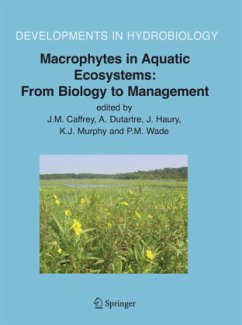Macrophytes and macrophytes ecology have gained an added importance with the introduction of, and legal requirement to implement, the European Water Framework Directive. This reflects the valuable role that aquatic plant communities play in assessing the ecological status of water bodies. Significant changes in the status and general abundance of these communities has been recorded in the last three decades, consequent on such factors as global warming and, increasingly, on the spread of aggressive alien species. These changes have been most felt in those waters that are exploited for amenity and recreational pursuits.
The increased biomass of aquatic vegetation in water bodies has adversely impacted on leisure use of these systems but also on their use for agricultural, flood relief, municipal and domestic purposes. The loss to national economies resulting from this excessive plant biomass has been appreciable and has put pressure on water managers to develop weed control procedures that are efficient, environmentally sensitive and cost-effective. The results from the most up-to-date research activities and field trials of leading aquatic plant scientists and managers in all five continents, aimed at resolving these weed problems, has been drawn together in this volume.
The title of this special issue, 'Macrophytes in aquatic ecosystems: from biology to management', is wide-ranging and reflects the broad scope and scale of the papers presented therein. It further recognises the old paradigm: 'knowledge to achieve management and management to achieve knowledge'.
Hinweis: Dieser Artikel kann nur an eine deutsche Lieferadresse ausgeliefert werden.
The increased biomass of aquatic vegetation in water bodies has adversely impacted on leisure use of these systems but also on their use for agricultural, flood relief, municipal and domestic purposes. The loss to national economies resulting from this excessive plant biomass has been appreciable and has put pressure on water managers to develop weed control procedures that are efficient, environmentally sensitive and cost-effective. The results from the most up-to-date research activities and field trials of leading aquatic plant scientists and managers in all five continents, aimed at resolving these weed problems, has been drawn together in this volume.
The title of this special issue, 'Macrophytes in aquatic ecosystems: from biology to management', is wide-ranging and reflects the broad scope and scale of the papers presented therein. It further recognises the old paradigm: 'knowledge to achieve management and management to achieve knowledge'.
Hinweis: Dieser Artikel kann nur an eine deutsche Lieferadresse ausgeliefert werden.








